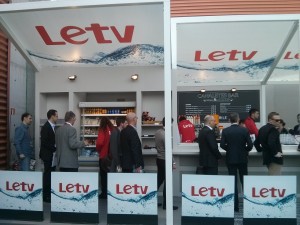MEDIA: LeTV Revs Up for HK Showdown with PCCW
Bottom line: LeTV will embark on an aggressive content-acquisition and hiring spree in Hong Kong in the second half of this year, as it aims to become the city’s second largest premium video service by the end of 2016.

As Hong Kong’s establishment fights over traditional TV broadcast licenses, mainland high-flyer LeTV (Shenzhen: 300104) is quietly taking aim at the market with a rapid but stealthy entree over the Internet. After a low-key start for a Hong Kong version of its Internet-based video service last fall, China’s leading online video company is rapidly turning up the volume of its local campaign, with plans to spend HK$6 billion ($770 million) to build up its library of local content for the small but lucrative market.
LeTV’s Hong Kong gamble marks the first step of what it hopes will be a global expansion to bring its Internet-delivered programming model to the rest of the world. The company uses a relatively unique business model of providing customers with low-cost, high-quality devices like TVs and smart phones, which come bundled with its core video services. The hope is that users will test out the service, and then chose to keep paying after their initial contracts expire.
According to the latest reports, LeTV will spend the big bucks over the next 3 years on both content production and also the licensing of programs for Hong Kong audiences. (English article) It’s aiming quite high, with a target of becoming Hong Kong’s second largest premium TV provider by the end of next year, behind only PCCW’s (HKEx: 8) popular Now TV.
A big part of the campaign could see LeTV acquire rights to programming and also hire talent from Asia Television, Hong Kong’s TV laggard that earlier this year was notified that its longtime broadcast license will be canceled in March 2016. LeTV’s Asia chief Mo Cui has given some aggressive targets for Hong Kong, where he’s aiming for 500,000 viewers during peak times by the end of this year and 1 million by the end of 2016.
That target would certainly bring LeTV within distance of Now TV, whose paid subscriber base has stayed relatively constant in recent years and reached just under 1.3 million by the end of 2014. LeTV said it currently has up to 100,000 local users of its service during peak times. But only 15-20 percent of those actually pay, translating to just 15,000 to 20,000 paid subscribers at the moment.
That means LeTV certainly has its work cut out, though Mo’s ambitious targets appear to refer to total viewers rather than just paid subscribers. LeTV has never been a company to flinch at a challenge these days, especially as its profile and stock have soared with China’s recent stock market rally.
The company’s shares have more than quadrupled since the beginning of the year, giving LeTV a market value of $21 billion and propelling it past Youku Tudou (NYSE: YOKU) to become China’s most valuable online video company. The rapid rise has also made LeTV the most valuable company on China’s Nasdaq-style ChiNext board, which has seen even bigger gains than the main boards in Shanghai and Shenzhen in the recent stock market rally.
Back in March, LeTV’s international team briefed me on the company’s global expansion plan, which began on China’s doorstep last August with the launch of its flagship service in Hong Kong and could extend to Taiwan by year end. The company told me it had signed up 15,000 paid subscribers in Hong Kong at that point, meaning that progress hasn’t been exactly lightning pace when compared with the latest figure of up to 20,000 paying users.
That will make this new campaign to rapidly bring in more local programs and talent even more critical, hinting that LeTV wants to step on the accelerator to speed up its HOng Kong sign-ups. If it really reaches its 500,000 viewer target by the end of this year and 15-20 percent of those are paying, that would equate to as many as 100,000 paying users, or 5 times the current total.
So we can probably expect to see some quick acquisitions of new local programming, and also perhaps some aggressive promotions that see LeTV sell its TVs and smartphones at highly subsidized prices, or perhaps even give them away for free. The company certainly has deep pockets to achieve its aims, and has a good record of past success in China. But I doubt PCCW will just sit back and let this newcomer coast into town, meaning we could see some heated promotions and other high-profile clashes in the second half of the year.
Related posts:
